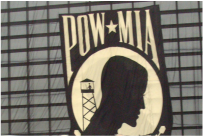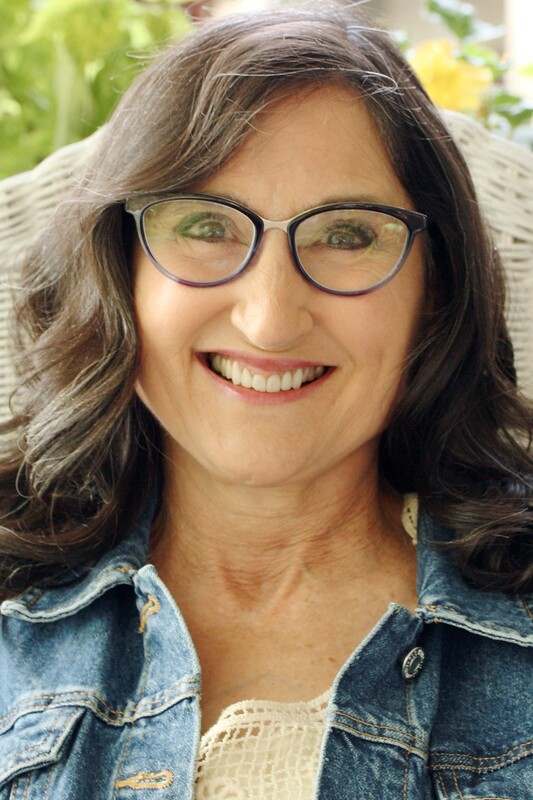|
If you have a minute—1:23 to be exact—watch this video of Eugene Yelchin talking about growing up in the Soviet Union and the tough choice he had to make. Yelchin’s 2012 Newbery Honor novel BREAKING STALIN’S NOSE is partially based on his own childhood. The book begins with a boy’s letter to Comrade Stalin telling the Soviet leader his greatest dream--to join the Young Soviet Pioneers. Of course, as seems to happen to main characters, the boy Sasha runs into trouble reaching his dream. He comes face to face with a hard, life-altering choice and in that choice defines himself. 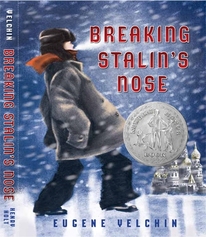 Hard choices come with a cost. And though our own may not be as pricey as Sasha’s or Eugene Yelchin’s, they still demand courage. I think of my daughter making the choice to pursue a career in screenwriting. As she was going off to college to major in film, I remember speaking with the mother of one of her friends. The friend had also considered majoring in the arts, but her mother told me she had convinced the girl to major in business. Perhaps that girl now has a good paying job and flew home for Thanksgiving with her family, while my daughter is twelve-hundred miles away in Los Angeles, working the holiday at a restaurant, sharing a bedroom with a friend to save on rent, and living daily in uncertainty about her future as a screenwriter. Sure, people all over the world are facing decisions that will cost them much more. But I am inspired by my daughter’s courage and willingness to bear the cost of following her heart. What about you? Share whose courage fills your heart and makes you want to live with more authenticity, or tell me about a life-altering choice you’ve made. Today welcome Middle Grade Author Rosanne Parry to the blog. Her new book WRITTEN IN STONE has been shortlisted for the Pacific NW Booksellers Association 2014 Book Awards. Take it away, Rosanne! 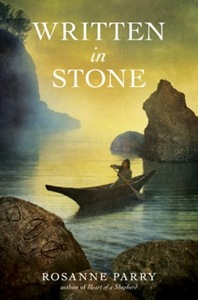 When I very first started writing WRITTEN IN STONE more than 15 years ago I thought I would write a contemporary piece about the Makah's resumption of whale hunting in 1999. Self-determination of natural resources is an important part of the American civil rights story and one I seldom see in books. But as I researched the story and talked with people in the tribe about whaling and what it meant to them, I realized that the more interesting story was not that they eventually reclaimed their whale hunting practices but that they voluntarily gave them up. When the Makah signed their treaty with the US they gave up 300,000 acres of timber in order to secure the right to hunt whales in their accustomed waters. But following the First World War, industrial whaling decimated gray and humpbacked whales all along the Pacific coast. The Makah will not hunt an endangered resource, so even though the whaling was their entire economy and the cornerstone of their spiritual life, they gave it up. They story of how you go on being the people you are when the thing that so defines you is gone, is a cultural survival story that I think will speak to many people beyond Native American communities. Beyond that I chose the year 1923 because it is a year before Native Americans were given American citizenship. Even after thousands of Indians from nearly every tribe fought in World War I, they were not allowed to vote. Everyone knows women gained the vote in 1920, but most people don't know that Indian's were denied the vote until 1924. By great coincidence, three other authors from Portland also have books out this year set in the 1920s. If you enjoy this era you might also enjoy: Whistle in the Dark by Susan Hill Long Born of Illusion by Teri Brown In the Shadow of Blackbirds by Cat Winters Thank you, Rosanne. The Makah tribe regained their whaling rights in 1999 when numbers of gray whales increased in Pacific Coastal waters. On a related subject, did you see the photos of the world’s rarest whale sighted several weeks ago near Victoria, B.C.? Scientists believe only 500 right whales remain and the last confirmed sighting of one in Pacific Canadian waters was in 1951. Check out the photos and story here, and let me know what you think. On day one of WWII for the United States Harold Anthony Bergbower was injured when the Japanese bombed Clark Field in the Philippines. Mistaken for dead, he was delivered to the morgue and his family notified by telegram.
The young Air Corps mechanic awoke, took the tag off his toe, put on his boots and went back to his unit. In May 1942, he was captured by the Japanese and held prisoner until the end of the war. In captivity he suffered beatings and starvation in four POW camps in the Philippines and a hell ship voyage to Japan where he worked in a slave labor camp. Not until September 1945 did his family discover Harold had been alive the whole time. Writing and researching PURE GRIT: HOW AMERICAN WORLD WAR II NURSES SURVIVED BATTLE AND PRISON CAMP IN THE PACIFIC, I reflected many times on the resilience of the human spirit. Seeing how others undergo great suffering and keep a sense of humor and compassion has been a great inspiration to me. Has some part of history inspired you? What historical person do you admire? And why? 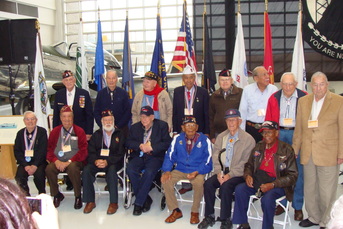 Last week I promised interviews with these WWII POWs, but the learning curve on the video editing program was too great. Do you ever get really revved about starting something new, and it turns out to be much harder than you thought? You start wondering if it's just a waste of time. That was me this week. I had this idea that I could produce short videos about history that people might want to watch. I believe history matters. I believe that we learn from the past, and I’m fascinated when I discover some new vantage on an event I thought I understood. I started off with high hopes, but ended up feeling defeated by technology. It would be easy to listen to that voice telling me this is a fruitless use of my time. But I want to live a little. Nothing ventured, nothing gained and all that. What’s the cost of a few days learning something new? A few days. Maybe a week. Now that’s living on the edge. :) 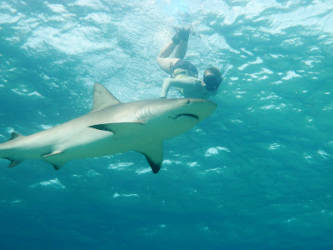 Photo thanks to Hannah Limtiaco Photo thanks to Hannah Limtiaco I feel silly when I realize I’ve become so entrenched that a project like this feels like a risk. But different things are risky for different people. Some people skydive or swim with sharks, but fear intimate relationships. Others live openhearted, creative lives, but don’t chance commitment. What I fear is failure, or looking foolish. Or both. If I stick to things I already know how to do, there’s less chance I’ll look silly and I won’t have frittered away my time. Advances in brain imaging technology show that human beings are wired to play it safe. But deep down, I know that moving out of my comfort zone is good for me. Looking back, it’s when I’ve taken a chance and had that difficult conversation that a relationship has grown. Last week when I dropped everything for an impromptu trip to Oregon to attend a Living History event featuring WWII veterans, I opened myself to the painful truth of how inhumane we humans can be. The result—I was deeply moved by the strength of the human mind, body and spirit to endure extreme hardship and brutality. And I had the chance to enjoy Multnomah Falls. Click here for sounds and video of the falls. Michael Ungar, Ph.D., a professor at Dalhousie University in Halifax, Nova Scotia says there is evidence that doing things that make us uncomfortable offers a cluster of psychological benefits. He calls it "the risk-taker's advantage." People who dare calculated risks are healthier, happier, and emotionally resilient. Here’s a great article on the topic: 10 Risks Happy People Take Every Day So stay tuned. Technology will not defeat me. I will have interviews with the ex-POWs I met and with Jan Thompson who produced the documentary Never the Same about the soldiers surrendered on Bataan & Corregidor who survived “hell ships” and slave labor camps. Her father was one of them. My new video project is called History Matters. It’s my little experiment with living on the edge. What about you? Did you do one thing today that scared you? That's advice from Eleanor Roosevelt. 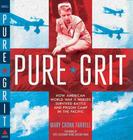 In anticipation of Veteran’s Day, here’s a sneak peek of my upcoming book, including photos! Remember this is from an uncorrected proof, so the color is off and the quality isn’t perfect. But you’ll meet a couple of the nurses featured, and see a bit of how the story begins. Click below where it says Download File. PURE GRIT: HOW AMERICAN WWII NURSES SURVIVED BATTLE AND PRISON CAMP IN THE PACIFIC.
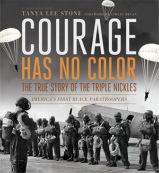 This week I attended a Living History celebration in McMinnville, Oregon, honoring American veteran’s. This is the second year the Evergreen Aviation & Space Museum has invited hundreds of students to come and hear first hand the stories of vets from WWII right up to the present. This year the program featured Ex-POWs from Bataan and Corregidor, as well as Tuskegee Airmen, one of the first black American aviators to serve in combat, the Tuskegee Airmen were pilots whose heroic World War II exploits helped persuade President Harry Truman to end segregation across the entire military. In COURAGE HAS NOT COLOR by Tanya Lee Stone you can read the story of America's first black paratroopers, known as the Triple Nickles. These men fought a little-known World War II attack on the American West by the Japanese. 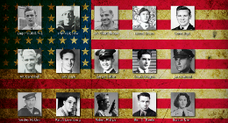 Also saw the documentary NEVER THE SAME – THE PRISONER OF WAR EXPERIENCE and met the film’s Emmy® Award-winning director Jan Thompson. Jan’s father was a POW captured by the Japanese after the surrender of Corregidor Island May 6, 1942. See the trailer here-> http://www.tragedyofbataan.com/ Next week I’ll post my interview with Jan about why she made the film talk to one ex-POW who knew two of the nurses in my book PURE GRIT. Any veterans in your family tree? Go ahead and name them in the comments. Veteran's Day is a holiday to honor all who have served our country. My father-in-law landed at Normandy one month after D-Day and fought in WWII in the Battle of the Bulge. My mother-in-law also wore army boots! Seriously, she was a 1st Lieutenant. My father and a brother also served. And okay, this is going way back, but my a relative served in the Civil War and another in the American Revolution. |
I'm fascinated to discover little-known history, stories of people and events that provide a new perspective on why and how things happened, new voices that haven't been heard, insight into how the past brought us here today, and how it might guide us to a better future.
I also post here about my books and feature other authors and their books on compelling and important historical topics. Occasionally, I share what makes me happy, pictures of my garden, recipes I've made, events I've attended, people I've met. I'm always happy to hear from readers in the blog comments, by email or social media. Archives
September 2023
Categories
All
|
||||||
